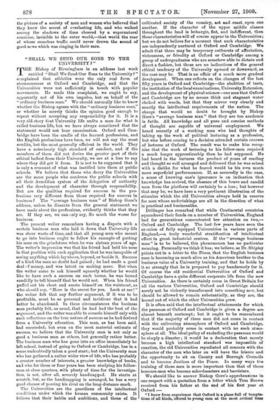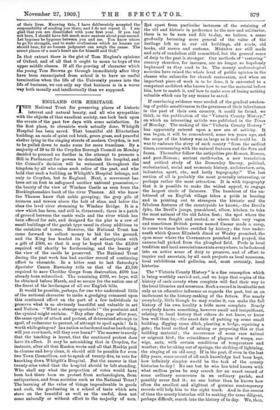" SHALL WE SEND OUR SONS TO THE UNIVERSITY ?
"
THE Bishop of Birmingham in an address last week entitled " Shall We Send Our Sons to the University P" complained that athletics were the only real form of strenuousness at Oxford and Cambridge, and that the Universities were not sufficiently in touch with popular movements. He made this complaint, we ought to say, apparently not of his own impulse, but on behalf of the " ordinary business man." We should naturally like to know whether the Bishop agrees with the " ordinary business man," or whether he merely thinks the opinion good enough to repeat without accepting any responsibility for it. It is a very old story that University life unfits a man for what is called business life, but we have always considered that the statement would not bear examination. Oxford and Cam- bridge have been the cradle of the learned professions, and the English professions have been, we will not say the most erudite, but the most generally efficient in the world. They have a notoriously high standard of conduct, and if the members of them did not derive the greater part of their ethical ballast from their University, we are at a loss to say where they did get it from. It is not to be supposed that it is only a remnant of what was instilled into them at public schools. We believe that those who decry the Universities are the same people who condemn the public schools with all their Arnoldian system of the delegation of authority and the development of character through responsibility. But are the qualities required for success in the pro- fessions very different from those required for success in business P The "average business man" of Bishop Gore's address, unless he dissents from the general statement we have made about the professions, evidently thinks that they are. If they are, we can only say, So much the worse for business.
The present writer remembers having a dispute with a certain business man who laid it down that University life was sheer waste of time, and that all young men who meant to go into business ought to follow his example of putting his nose on the grindstone when he was sixteen years of age. The writer's impression was that his friend had held his nose in that position with such application that he was incapable of seeing anything which lay above, beyond, or beside it. Success of a kind the man no doubt had gained ; he had made a good deal of money, and was intent on making more. But when the writer came to ask himself squarely whether he would like to have such a success on such terms, he was bond candidly to tell himself that he would not. When his friend puffed out his chest and smote himself on the waistcoat, as who should say, " Here is the secret for you. Look at me !" the writer felt that any further argument, if it was to be profitable, must be so personal and invidious that it had better be abandoned. In these circumstances the business man probably felt, as usual, that he had had the best of the argument, and the writer was able to console himself only with such reflections on the true nature of success as he had derived from a University education. This man, as has been said, had succeeded; but even on the most material estimate of success, we believe that the University man is not only as good a business man as others, but generally rather better. The business man who has gone into an office immediately he left school, instead of going to Oxford or Cambridge, has in a sense undoubtedly taken a good start ; but the University man who has gathered a rather wider view of life, who has probably a greater number of interests, a greater knowledge of books, and who for three or four years has been studying his fellow- man at close quarters, with plenty of time for the investiga- tion, is not, after all, severely handicapped. He starts at scratch, but, as the handicapping is arranged, he has a very good chance of passing his rival on the long-distance mark.
The Universities are the guardians of the intellectual conditions under which the human community exists. It follows that their habits and ambitions, and those of the cultivated . society of the country, act and .react,upon one another. If the character of the upper middle classes throughout the land is lethargic, flat, and indifferent, then those characteristics will of course appear in the Universities ; but we do not believe for a moment that such characteristics are independently nurtured at Oxford and Cambridge. We admit that there may be temporary outbursts of affectation, viciousness, or frivolity at Oxford or Cambridge among a group of undergraduates who are somehow able to dictate and
a fashion, but these are no indications of the general ethical tendency of the University upward or downward, as the case may be. That is an affair of a much more gradual development. When one reflects on the changes of the last fifty years in Oxford and Cambridge—the abolition of tests, the institution of the local examinations, University Extension, and the development of physical science—one sees that Oxford and Cambridge are by no means thick and stagnant water choked with weeds, but that they mirror very clearly and exactly the intellectual requirements of the nation. The charge that would no doubt be brought by Bishop Gore's "average business man " that they are too academic is futile. All knowledge and all pure and concise methods of thought are capable of universal employment. We heard recently of a working man who had thoughts of taking up the work of political lecturing as a profession, but who before coming to a decision attended certain courses of lectures at Oxford. The result was to make him recog- nise that the work of lecturing to his fellow-men required a much longer apprenticeship than be had supposed. He had heard in the lectures the product of years of reading and thought so well arranged and delivered that he was seized with a dislike for what he feared would be his own much more superficial performances. If, as assuredly is the case, a sense of knowing one's ignorance is an indication that knowledge has arrived, the absence of this brave and candid man from the platform will certainly be a loss ; but however that may be, we have here a very pertinent illustration of the stimulus which the old Universities always hold in reserve for men whose undertakings are all in the direction of what is practical and businesslike.
Dellinger has remarked that while Continental countries squandered their funds on a number of Universities, England had for generations concentrated her attention on two,— Oxford and Cambridge. The last' few years have seen the creation of fully equipped Universities in various parts of England,—a truly wonderful stratification of intellectual effort in great industrial centres. If the " average business man" is to be believed, this phenomenon has no particular meaning. Personally we think it has; we believe, as Dr. Shipley points out in a letter to the Times, that the English business man is becoming as much alive as his American brother to the business value of a University training, and that he holds by it so strongly that he is prepared to pay handsomely for it. Of course the old residential Universities of Oxford and Cambridge have a quite different corporate life from the new Universities. As there is certainly room in Great Britain for all the various Universities, Oxford and Cambridge should surely not be violently transformed into something new, but should be allowed to remain substantially, as they are, the kernel out of which the other Universities grew.
It is often said that the intellectual attainments for which the paesman at Oxford and Cambridge is given a degree are almost beneath contempt; but it ought to be remembered that if the majority of these men did not come in contact with the enlivening atmosphere of Oxford and Cambridge, they would probably come in contact with no such atmo- sphere at all. The ideal policy of excluding the passman would be simply a disaster ; it would be a declaration that merely because a high intellectual standard was impossible of exaction, the old Universities repudiated all concern with the character of the men who later on will have the leisure and the opportunity to sit on County and Borough Councils and to become Justices of the Peace. In many ways the training of these men is more important than that of those honours-men who become schoolmasters and barristers.
We should like to answer Bishop Gore's apprehensions in one respect with a quotation from a letter which Tom Brown received from his father at the end of his first year at Oxford :- "I know from experience that Oxford is a place full of tempta- tions of all ]rinds, offered to young men at the most critical time
of their lives. Knowing this, I have deliberately accepted the responsibility of sending you there, and I do not repent it. I am glad that you are dissatisfied with your first year. If you had not been, I should have felt much more anxious about your second. Let bygones be bygones between you and me. You know where to go for strength, and to make confessions which no human ear should hear, for no human judgment can weigh the cause. The secret places of a man's heart are for himself and God."
In that extract there is the gist of Tom Hughes's opinions of Oxford, and of all that it ought to mean to boys of the upper middle classes. If all the proving of character which the young Tom Browns go through immediately after they have been emancipated from school is to have no useful termination when the life of the University passes into the life of business, we can only say that business is in a worse way both morally and intellectually than we supposed.















































 Previous page
Previous page